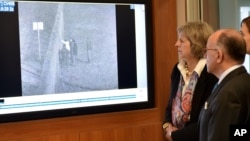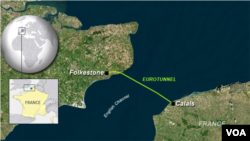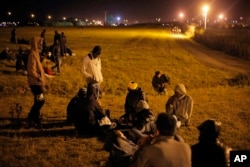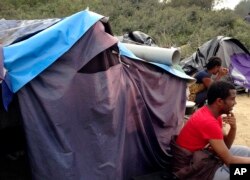In a move to cooperate more closely in tackling the migrant crisis and crack down on migrant traffickers, France and Britain have signed an agreement establishing a joint command center in the French port city of Calais, where thousands try to cross over to Britain illegally.
London says it will increase manpower and funding in Calais to help French authorities grapple with a flood of migrants trying to cross the English Channel to Britain.
French and British officers will run the new command center and cameras, fencing, floodlights and infrared detection will be increased substantially to deter migrants trying to cross, including those risking the dangerous journey through the Channel Tunnel.
Speaking in Calais with British Home Secretary Theresa May shortly after signing the agreement, French Interior Minister Bernard Cazeneuve said larger solutions to the migrant crisis must be found on the European and international levels.
Cazeneuve is also to consult German counterpart Thomas de Maiziere in Berlin, who says Germany may see as many as 800,000 asylum applicants this year.
About 3,000 migrants are camped in Calais, but they are only part of a much bigger problem. More than 240,000 migrants have crossed into Europe this year. In July alone, European Union border officials announced more than 107,000 migrants reached EU borders, a record high.
The new measures aim to fast-track procedures for asylum seekers in Calais, but also increase the number of economic migrants being sent home.
May called for focusing more attention on the countries the migrants come from.
“This means working with our European Union and international partners to target development aid and increase investment. We need to help source and transit countries develop economic opportunities, fight criminal networks that facilitate people smuggling and return people to their home countries more easily,” she said.
EU and African Union leaders will discuss the migration crisis at a special summit in November.
U.N. reaction
U.N. High Commissioner for Refugees António Guterres said he welcomed the joint Franco-British declaration on the situation in Calais and the action plan announced Thursday.
In a statement, Guterres said, “I welcome ... the humanitarian and protection elements of the plan, while fully recognizing the importance of combatting smuggling and trafficking, which exploit vulnerable individuals.
“Many of those in Calais are likely to be in need of international protection, having come from Afghanistan, Eritrea, Somalia, Sudan and Syria. We look forward to working closely with France and the U.K. [United Kingdom] to support efforts to find solutions,” he said.
Guterres said for efforts to crack down on human traffickers to be effective, "we must increase the number of legal avenues for people in need of protection to come to Europe."














